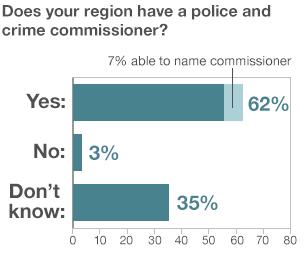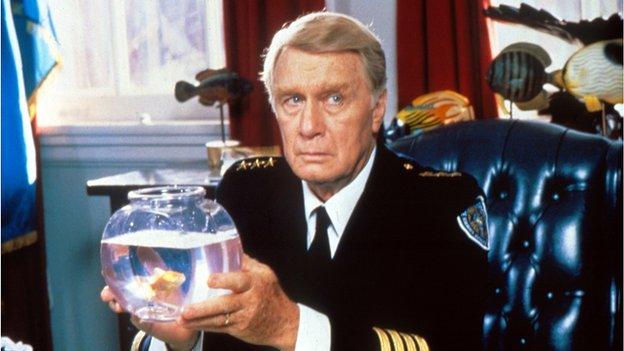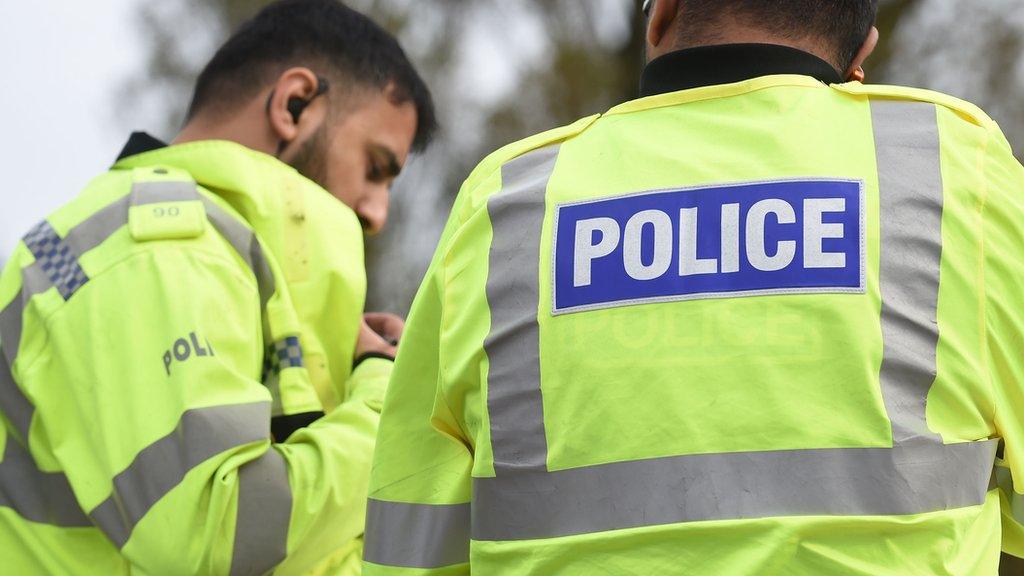'One in three unaware' of police and crime commissioner
- Published
- comments
Tony Lloyd, Association of Police and Crime Commissioners: "It's a measured success"
More than a third of people in England and Wales have no idea if there is a police and crime commissioner (PCC) in their area, a BBC poll suggests.
The findings, published a year after the first PCC elections were held, indicate that 35% do not know if they have one, while 3% think - incorrectly - that they do not.
The PCC's role is to oversee chief constables and forces' budgets.
The government said they were getting extra money and were "here to stay".
Last year's election saw an average turnout of just 14.9%.
This was historically low, leading the Electoral Commission to describe it as "a concern for everyone who cares about democracy".
There are 41 PCCs in place in all areas of England and Wales except London, where the equivalent job is done by elected mayor Boris Johnson.

Influenced by systems in place in parts of the US, their biggest tasks are to hire and fire chief constables and hold them to account for forces' performances.
They also oversee community safety and set out budgets, reporting annually on progress.
'Accessible'
The government says PCCs will give people more control over policing, but opponents have warned the changes will politicise the service - and that the low turnout showed people did not want them.
A ComRes poll for the BBC suggests 38% of people living in areas where there are PCCs either do not know if there is one, or think that there is not.
Some 62% were aware of their existence and 7% said they even knew the name of their PCC.
Meanwhile, 41% said they had had a positive effect on policing and 10% negative.
Older people had the greatest awareness of PCCS, with 68% of over-65s saying they knew they had one, compared with 51% of 18- to 24-year-olds.
Policing Minister Damian Green is expected to announce a funding boost designed to encourage innovation in the role when he makes a speech at an event marking the first anniversary of the existence of PCCs in London later.
The Police Innovation Fund is due to launch in the 2014-15 financial year.
But Mr Green will say that a "precursor" fund worth up to £20m would be made available this financial year to "incentivise collaboration, support improved digital working and enable PCCs to invest in a range of other innovative delivery approaches", in addition to the £50m that will be available each year after the fund formally launches in 2014.
PCCs are encouraged to bid for a portion of the extra funds once details of the application process have been sent to them, Mr Green will add.
At the first elections, held on 15 November last year, turnout varied from 11.6% in Staffordshire to 20% in Northamptonshire.
The previous record low turnout for a national poll in peacetime was 23% for the 1999 European elections.
But Home Secretary Theresa May said at the time that PCCs' profile would increase over time: "The police and crime commissioners are visible. They'll be accessible. They've been elected and crucially they will be accountable to people through the ballot box."
For Labour, shadow policing minister Jack Dromey said the government had "mishandled this from the start".
He added: "Last year they spent £100m on chaotic November elections where only 15% of people voted - even though that could have paid for thousands of police officers.
"And the evidence today that nine out of 10 voters do not know who their police and crime commissioner is shows the policy isn't meeting the huge promises the home secretary made."
But Mr Green said: "For all its imperfections - concerns over expenses, clashes between PCCs and chiefs, the occasional questionable appointment - the democratic system we have installed is infinitely better than that which preceded it."
He added: "I am sure some people thought PCCs were a passing fad. But, on the eve of the anniversary of the first elections, they should now be able to see that they are here to stay."
ComRes interviewed 1,551 adults aged 18 and above by telephone between 18 and 27 October. The results were weighted to be representative of all British adults.
- Published14 November 2013

- Published21 April 2016
